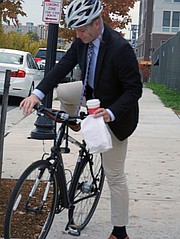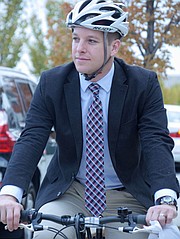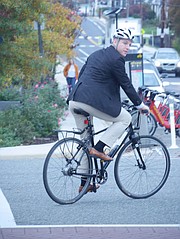Adam Schildge straps on his helmet, hops on his bicycle and heads the 7.2 miles from his house in Del Ray to his office at the Federal Transit Administration (FTA) down by the Navy Yard in D.C. It will take him half an hour to get there where he is transitioning from Senior Transportation Analyst to Acting Division Chief of Urban Transit Programs. "I went to new supervisor training last week," he said.
Schildge says he bikes about half the time with weather not an obstacle. He just puts on long pants and a weather proof jacket down to 20 degrees. “Weather doesn’t stop people from skiing,” he added.
Schildge recently received the Sammie Award from the Partnership for Public Service, "an organization that highlights the good work that civil servants do." Schildge said he received his Call to Service Award given to someone "35 years old or under with fewer than 5 years of public service." The award was based on his efforts to design and implement a $3.5 billion climate resilience program for public transit in the aftermath of Hurricane Sandy.
Colleagues said Schildge demonstrated exceptional management skills, analytical knowledge and coalition-building talent in addition to his development of a novel methodology for rating and evaluating the projects. He says this is fairly unique, and "I knew that distributing $3.5 billion in discretionary grant funds demanded an extremely rigorous process to set evaluation criteria."
Schildge says they received 61 eligible project proposals from 10 applicants totaling over $6.6 billion. They allocated $3.6 billion to 9 applicants for 40 of the 61 proposed resilience projects.
The gala award ceremony was held in the Mellon Auditorium on Constitution Avenue on Oct. 8 and, "it was overwhelming. We call this the Oscars of government service. I was there with other honorees who were being given lifetime awards for really important achievements like finding a new treatment for cancer, and I felt honored to be among them.”
Schildge and his wife were escorted to the private pre-party and he says they walked by a series of 7-foot billboards including one with a picture of himself and including the background for his award: "I was bigger than life." He said there were many top officials from his agency in attendance that night, the MC for the evening was CBS moderator Chuck Todd, and he was able to have dinner with the Secretary of Transportation.
The Partnership for Public Service is a nonprofit, nonpartisan organization that helps government strengthen the civil service through advocacy, education and outreach and through providing assistance to federal agencies to improve their management and strengthen their leadership capacity. The partnership describes this award as “one of the most prestigious honors a Federal employee can receive during their career.”
Schildge said, "I had to be honest with them about the criteria for the award because I would be 36 by the time the award was given and have over 5 years of public service by then. But I was lucky they said it was OK."
Schildge explains his work on designing a model for transportation resilience to reduce damages in the event of a future disaster: "You have to capture uncertainty. It's complex math. But, we don't know what disaster will happen or when." So they estimate what disasters will happen based on the past, the probability of it happening in the future, and input engineering estimates of cost with, and without, a disaster. He said transit was neglected during the time highways were being built. "And we are still using the Tappan Zee Bridge that was built in 1955 to last 30 years. But," he added, "Now we have learned to look ahead. We want to do things that will make a difference over the next half century."
For instance, he cites a project in New Jersey. There was a degraded marine slip where, when the water got high enough, it flowed right over into Hoboken. That can be fixed for the future. He said, "You should know your vulnerabilities.”
He explains that in Lower Manhattan they knew there was a risk because of the floodplain but didn't understand how much damage the water could do to the transit systems. Water seeks its own paths and goes through all of the tunnels. The solution was to use some of the funding for automatic closable ventilation grates. "All the tools are out there. You have to pick where to invest and money isn't limitless."
Schildge came to the FTA from his job at a currency trading desk with the Bank of America. But he left to get a graduate degree in urban planning because "I wanted to make a noticeable difference for the public good.”


